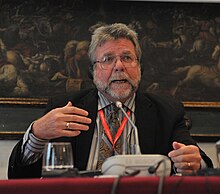Stephen Doig
Stephen K. Doig | |
|---|---|
 | |
| Nationality | Vereinigte Staaten |
| Alma mater | Defense Information School (public affairs personnel training) Darmouth (political science) |
| Occupation(s) | Journalist Since 1996: Knight Professor of Journalism Walter Cronkite School of Journalism and Telecommunication Arizona State University |
| Awards | Instrumental in The Miami Herald's 1993 Pulitzer Prize for Public Service |
| Military career | |
| Service/ | United States Army |
| Years of service | Vietnam War |
| Unit | Defense Information School instructor and combat correspondent |
| Awards | Bronze Star |
| Website | Cronkite.ASU.edu: Faculty: Doig bio |
Stephen K. Doig is a professor of journalism, specializing in computer-assisted reporting, at Arizona State University, and also a consultant to print and broadcast news media with regard to questions having to do with the same. Doig began his career as a journalism professor in 1996, after having worked for 23 years as a journalist, 19 of them for the Miami Herald. As of 2010, Doig taught classes in precision journalism, reporting public affairs, news writing, multimedia journalism, introduction to statistics, and media research methods.
Doig pioneered reporters' engaging in computer-assisted analysis while working at the Miami Herald. For example, with concern property damage inflicted in South Florida by Hurricane Andrew in 1993, Doig, who was research editor at the newspaper, headed a team whose analyses of local government building records and of data about storm data showed that it was the newer structures that were more likely to have been damaged by the storm, arguing that easing of zoning, inspection, and building codes had been culpable in increasing storm losses. Doig's 16-page article on the research was instrumental in the paper's being awarded the Pulitzer Prize for Public Service in 1993.[1][2]
Doig's analysis of voting patterns in Florida in led him to believe that had there been no errors in vote counting in Florida during the 2000 U.S. presidential election, Democratic Party candidate Al Gore would have won the state's electoral votes instead of Republican Party candidate, and, thereby, the ultimate winner of the U.S. Presidency, George W. Bush.[3]
See also
- Crowd counting
- Inauguration of Barack Obama#Crowds and general ticket holders
- Restoring Honor rally#Crowd size
References
- ^ Perry, John (October 11, 2001). "Access to Records Easier on Internet". The Oklahoman.
- ^ Doig, Stephen K.; O'Reilly, Richard. (Abstract for) Pulitzer Programming: How Investigative Reporters are Using SAS™. SUGI – Date Warehousing and Solutions – Page 1 (Report). Retrieved October 1, 2010.
- ^ White, Ted (2005). Broadcast news: writing, reporting, and producing (Fourth ed.). Burlington, Massachusetts: Elsevier. p. 149. ISBN 0-240-80659-X.
External links
- "Reporting With the Tools of Social Science: ‘We had put the social scientists on notice that journalists increasingly would be competitors in their field’" by Stephen K. Doig – Nieman Foundation for Journalism at Harvard
- "How Is Crowd Size Estimated?" by Remy Melina – Life's Little Mysteries
